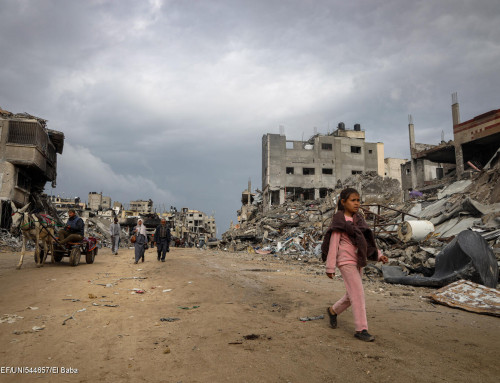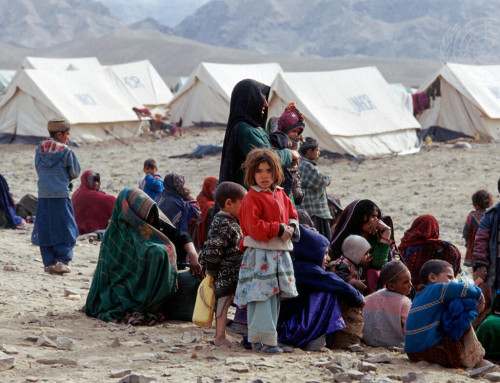The Special Representative of the Secretary-General for Children and Armed Conflict, Virginia Gamba, concluded a three-day visit to Cairo which provided opportunities for her Office and the League of Arab States to solidify their pledge to end and prevent grave violations against children in armed conflict in the Arab world and discuss the way forward.
The two entities jointly reaffirmed the importance to protect the rights of children before, during, and after conflict and their longstanding engagement in collaborating in delivering this promise.
During her visit, the Special Representative welcomed the opportunity to meet with the Minister of Foreign Affairs of the Arab Republic of Egypt, H.E. Sameh Hassan Shoukry, to discuss closer collaboration on child protection. As part of her engagement with the League of Arab States, she further exchanged with the Secretary-General of the League of Arab States, H.E. Ahmed Aboul Gheit. Additionally, she met with the Assistant Secretary-General for Social Affairs of the League of Arab States, Dr. Haifa Abu Ghazaleh, the Permanent Representative of the State of Qatar to the League of Arab States, H.E. Ambassador Salem Mubarak Al Shafi, the Permanent Representative of the Kingdom of Saudi Arabia to the League of Arab States, H.E. Ambassador Abdulrahman bin Saeed Al-Jumah, the Ambassador of the Kingdom of Norway to Egypt and Libya, H.E. Hilde Klemetsdal, the United Nations Resident Coordinator, Ms. Elena Panova, and members of the United Nations Country Team.
Children and youth account for a majority of the population in the Arab world, including in conflict-affected countries, making the collaboration around the Children and Armed Conflict mandate of paramount importance for the partnership between the UN and the LAS, the Special Representative emphasized. There has been progress in recent months by Arab States in enhancing the protection of children in armed conflict through concrete and practical measures, and the United Nations supports such efforts.
“Children and youth represent a dynamic, powerful, and resilient strength for the Arab region. The past decade has had its share of challenges for them, with an increasing number of social, political, and security changes in the region; and in that context, the protection of all children and of their rights must remain a priority,” the Special Representative stressed.
New and emerging crises, as well as protracted armed conflict in countries of the region, have forced millions of children to flee their homes, making them more vulnerable to being recruited or used by armed groups, killed or maimed, or victims of other crimes such as sexual violence, including trafficking for sexual purposes. In situations of conflict, children’s existing vulnerability to violations of their rights has been exacerbated in recent years by the COVID-19 pandemic, making their effective protection from the harms of war an increasingly remote goal.
Regional organisations have an instrumental role to play in the prevention of grave violations against children as highlighted recently by the Security Council in Resolution 2427 (2018), which emphasized the critical contribution of regional and subregional organizations in protecting children from hostilities as well as in supporting national authorities to do so.
“The protection of children before, during, and after conflict, requires us to take stronger prevention steps, including in our mediation and peace negotiation efforts, to ensure that all children can access a peaceful future, per the promises of the Sustainable Development Goals. We have a common responsibility not only to protect children from the ravages of wars but also to support them in their recovery and equip them with the tools that are required to build peaceful and wealthy societies throughout the Arab world,” Virginia Gamba added.
Note to editors:
Countries on the CAAC agenda in the Arab region: Iraq, Lebanon, Libya, State of Palestine, Somalia, Sudan, Syria, Yemen
###
For additional information, please contact:
Fabienne Vinet, Communications Officer, Office of the Special Representative of the Secretary-General for Children and Armed Conflict
+1-212-963-5986 (office) / +1-917-288-5791 (mobile) / vinet@un.org
Follow us on Instagram, Twitter and Facebook:
https://www.instagram.com/nochildreninwar/
www.twitter.com/childreninwar
www.facebook.com/childrenandarmedconflict
###
من أجل تعاون وثيق حول منع الانتهاكات الخطيرة بحق الأطفال في العالم العربي
٠٨ يونيو ٢٠٢٢
- يُشكل الأطفال والشباب غالبية السكان في العالم العربي، بما في ذلك الدول المتأثرة بالنزاع، ما يجعل التعاون بشأن الأطفال والنزاع المسلح ولاية بالغة الأهمية للشراكة بين الأمم المتحدة وجامعة الدول العربية، بحسب ما أكدت عليه الممثلة الخاصة خلال اجتماعاتها في القاهرة
القاهرة/نيويورك، 7 يونيو/حزيران 2022 – اختتمت المُمثلة الخاصة للأمين العام المعنية بالأطفال والنزاع المسلح، السيدة فيرجينيا جامبا، زيارة إلى القاهرة استغرقت ثلاثة أيام، أتاحت لمكتبها ولجامعة الدول العربية فرصا لتعزيز تعهدهما بإنهاء ومنع الانتهاكات الخطيرة ضد الأطفال في النزاعات المسلحة في العالم العربي وبحث سبل المضي قدما.
أكد الجانبان على أهمية حماية حقوق الأطفال قبل، وأثناء، وبعد النزاع وانخراطهما طويل الأمد في التعاون من أجل تحقيق هذا الوعد.
وخلال زيارتها، رحبت الممثلة الخاصة بفرصة مقابلة وزير خارجية جمهورية مصر العربية، معالي سامح حسن شكري، لبحث مزيد من التعاون عن كثب بشأن حماية الطفل. وفي إطار انخراطها مع جامعة الدول العربية، عقدت الممثلة الخاصة للأمين العام مباحثات مع الأمين العام لجامعة الدول العربية، معالي أحمد أبو الغيط، والأمين العام المساعد لجامعة الدول العربية للشؤون الاجتماعية، الدكتورة هيفاء أبو غزالة. وعلاوة على ذلك، اجتمعت الممثلة الخاصة مع المندوب الدائم لدولة قطر لدى جامعة الدول العربية، سعادة السفير سالم مبارك الشافعي، والمندوب الدائم للمملكة العربية السعودية لدى جامعة الدول العربية، سعادة السفير عبد الرحمن بن سعيد الجمعة، وسفير مملكة النرويج لدى مصر وليبيا، سعادة هيلدا كليمتسدال، والمُنسقة المُقيمة للأمم المتحدة في مصر، السيدة إلينا بانوفا، وأعضاء بفريق الأمم المتحدة القُطري في مصر.
يُشكل الأطفال والشباب غالبية السكان في العالم العربي، بما في ذلك الدول المتأثرة بالنزاع، ما يجعل التعاون بشأن الأطفال والنزاع المسلح ولاية بالغة الأهمية للشراكة بين الأمم المتحدة وجامعة الدول العربية، بحسب ما أكدت عليه الممثلة الخاصة. ولقد أحرزت جامعة الدول العربية تقدما على مدى الشهور الأخيرة في تعزيز حماية الأطفال في النزاع المسلح عبر إجراءات ملموسة وعملية، والأمم المتحدة تدعم مثل تلك الجهود.
وشددت الممثلة الخاصة على أن “الأطفال والشباب يُشكلان مصدر قوة دينامي ومؤثر ومرون بالنسبة إلى المنطقة العربية. ولقد كان للعقد المُنصرم نصيبه من التحديات بالنسبة لهم، مع عدد متزايد من التحديات الاجتماعية والسياسية والأمنية في المنطقة؛ وفي هذا السياق ينبغي أن تظل حماية جميع الأطفال وحقوقهم أولوية.”
وقد أجبرت الأزمات الجديدة والناشئة، وكذلك النزاع المُسلح طويل الأمد في المنطقة، ملايين الأطفال على الفرار من ديارهم، وجعلتهم أكثر عرضة لأن يتم تجنيدهم أو استغلالهم من قبل الجماعات المسلحة، أو قتلهم أو تشويههم، أو أن يُصبحوا ضحايا لجرائم أخرى كالعنف الجنسي، بما في ذلك الاتجار لأغراض جنسية. وفي أوضاع النزاع، زاد الضعف القائم لدى الأطفال إزاء الانتهاكات لحقوقهم سوءا في السنوات الأخيرة جراء جائحة كوفيد-19، ما يجعل توفير الحماية الفعالة لهم من أضرار الحرب هدفا بعيد المنال على نحو متزايد.
تلعب المنظمات الإقليمية دورا أساسيا في منع الانتهاكات الجسيمة بحق الأطفال، كما تم توضيحه مؤخرا من قبل مجلس الأمن بموجب القرار 2427 (2018)، الذي شدد على المساهمة الحاسمة للمنظمات الإقليمية ودون الإقليمية في حماية الأطفال من الأعمال العدائية، وكذلك في دعم السلطات الوطنية للقيام بذلك.
وقالت السيدة فيرجينيا جامبا، “إن حماية الأطفال قبل النزاع وأثناءه وبعده، تتطلب منا اتخاذ خطوات وقائية أقوى، بما في ذلك جهود الوساطة ومفاوضات السلام، لضمان وصول جميع الأطفال إلى مستقبل آمن، وفقا لوعود أهداف التنمية المستدامة. وتقع على عاتقنا مسؤولية مشتركة ليس فقط لحماية الأطفال من ويلات الحروب، ولكن أيضا لدعمهم في التعافي وتزويدهم بالأدوات اللازمة لبناء مجتمعات مسالمة وغنية في جميع أنحاء العالم العربي.”
ملاحظة للمحررين:
البلدان المدرجة على جدول أعمال حماية الأطفال في النزاعات المسلحة في المنطقة العربية هي: العراق، لبنان، ليبيا، فلسطين، الصومال، السودان، سوريا، اليمن
###
لمزيد من المعلومات، يرجى الاتصال ب:
فابيان فينيه، مسؤولة الاتصالات، مكتب الممثل الخاص للأمين العام المعني بالأطفال والنزاع المسلح، +1-212-963-5986 (مكتب)، +1-917-288-5791 (جوال)، أو vinet@un.org
تابعونا على مواقع التواصل الاجتماعي:
https://www.instagram.com/nochildreninwar/
www.facebook.com/childrenandarmedconflict


